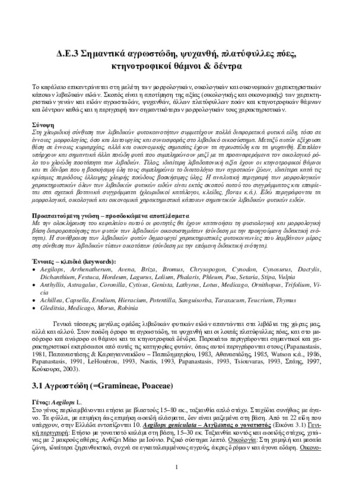EPUB
(6.94 MB)
Download
Adobe PDF
(2.88 MB)
| Title Details: | |
|
Important grasses, legumes, herbs, fodder trees and shrubs |
|
| Authors: |
Vrachnakis, Michail |
| Reviewer: |
Papanastasis, Vasileios |
| Subject: | NATURAL SCIENCES AND AGRICULTURAL SCIENCES > AGRICULTURAL SCIENCES > NATURAL RESOURCES, EARTH AND ENVIRONMENTAL SCIENCES > NATURAL RESOURCES > LAND RESOURCES > LAND > RANGELAND MEDICINE AND HEALTH SCIENCES, LIFE SCIENCES, BIOLOGICAL SCIENCES > LIFE SCIENCES > FUCTIONAL AND ORGANISMIC BIOLOGY > ZOOLOGY/ANIMAL BIOLOGY > ORGANIC ANIMAL FARMING MEDICINE AND HEALTH SCIENCES, LIFE SCIENCES, BIOLOGICAL SCIENCES > LIFE SCIENCES > FUCTIONAL AND ORGANISMIC BIOLOGY > ECOLOGY > RANGE COLOGY NATURAL SCIENCES AND AGRICULTURAL SCIENCES > AGRICULTURAL SCIENCES > NATURAL RESOURCES, EARTH AND ENVIRONMENTAL SCIENCES > NATURAL RESOURCE MANAGEMENT > LAND MANAGEMENT > RANGE MANAGEMENT MEDICINE AND HEALTH SCIENCES, LIFE SCIENCES, BIOLOGICAL SCIENCES > HEALTH SCIENCES > NUTRITIONAL SCIENCES > ANIMAL NUTRITION |
| Keywords: |
Aegilops
Arrhenatherum Avena Briza Bromus Chrysopogon Cynodon Cynosurus Dactylis Dichanthium Festuca Hordeum Lagurus Lolium Phalaris Phleum Poa Setaria Stipa Vulpia Anthylis Astragalus Coronilla Cytisus Genista Lathyrus Lotus Medicago Ornithopus Trifolium Vicia Achillea Capsella Erodium Hieracium Potentilla Sanguisorba Taraxacum Teucrium Thymus Gleditsia Morus Robinia |
| Description: | |
| Abstract: |
This chapter focuses on the study of morphological, ecological and economic characteristics of some rangeland plant species. The aim is to assess the value (ecological and economic) characteristics of genera and species of grasses, legumes, other broadleaf herbs andfodder shrubs and trees and to describe their main morphological characteristics. Upon completion of this chapter, students will understand the physiologically- and morphologically-based differentiation of plants of rangeland ecosystems (link with the previous Unit). The aggregation of rangeland plants forms distinctive plant communities that take part in the composition of rangeland habitat types (link to the next Unit).
|
| Table of Contents: |
Unit 3. Important grasses, legumes, herbs and fodder shrubs & trees
3.1 Grasses (= Gramineae, Poaceae) 3.2 Legumes (= Fabaceae, Leguminosae, Papilionaceae) 3.3 Other broad-leaved herbs 3.4 Fodder-raising shrubs and trees Parallel documents Related web sources References Evaluation criteria A. Activities B. Self assessment |
| Technical Editors: |
Rapti, Elli Tantos, Alexandros |
| Type: |
Chapter |
| Creation Date: | 2015 |
| Item Details: | |
| License: |
http://creativecommons.org/licenses/by-nc-nd/3.0/gr |
| Handle | http://hdl.handle.net/11419/1198 |
| Bibliographic Reference: | Vrachnakis, M. (2015). Important grasses, legumes, herbs, fodder trees and shrubs [Chapter]. In Vrachnakis, M. 2015. RANGELAND SCIENCE [Undergraduate textbook]. Kallipos, Open Academic Editions. https://hdl.handle.net/11419/1198 |
| Language: |
Greek |
| Is Part of: |
RANGELAND SCIENCE |
| Number of pages |
20 |
| Publication Origin: |
Kallipos, Open Academic Editions |


